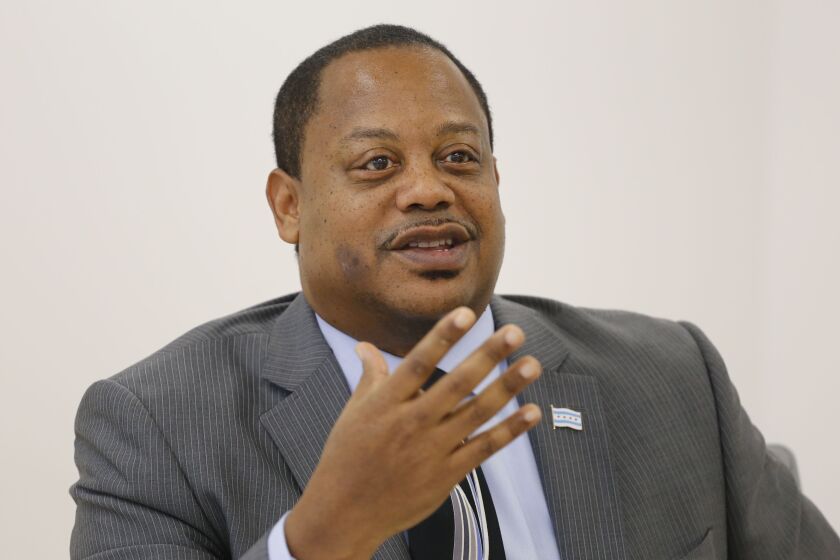Amid winds of change as America confronts its race issue, a reparations resolution dismissed by many as the stuff of dreams was unanimously passed by a Chicago City Council committee Friday and is scheduled to go before the full council June 17.
The resolution would establish a “Chicago Citizens of African Descent Reparations Commission” to investigate how one of the most segregated cities in the nation could best make amends for the impact of slavery.
Up for discussion by the Committee on Human Relations Thursday, black and Latino aldermen called the resolution timely and necessary, in the aftermath of the cellphone-recorded killing of George Floyd in Minneapolis and protests that grew violent as they unfurled across the nation, triggering a collective discourse over institutional racism.
With the committee vote on the resolution tabled for Friday, Mayor Lori Lightfoot’s administration introduced an alternative late Thursday. It had one key difference.
Lightfoot sought to drop establishment of the 16-member commission that would be tasked with holding hearings and developing a plan to “ensure equity, equality and parity for citizens of African descent in Chicago who are mired in poverty.”
The mayor’s office declined to address the reparations resolution or why the mayor sought to ditch the commission, saying in a statement that Lightfoot is all for righting past wrongs.
“The economic, health and social disparities that plague African Americans are the result of decades of discrimination, segregation and systemic racism,” a spokeswoman said.
“Mayor Lightfoot is committed to and supports examination of the state of equity in Chicago to begin to right the wrongs of the past in order to overcome the many obstacles to employment, education, housing, justice, due process, health care and more facing African Americans.”
Committee Chair Ald. Roderick Sawyer (6th) said Lightfoot’s version missed the point.
“I first introduced this last September. The mayor introduced her substitute Thursday, taking out the creation of the commission. My committee members were not in favor of that substitute,” Sawyer said.
“The committee felt the creation of a commission was the most important part of this resolution. We’ll be introducing this before full City Council. I don’t see it not passing.”
The commission would include the mayor or her designee, five aldermen and 10 community members. It would remain in place for 20 years, to monitor and ensure compliance.
Sawyer expressed regret that the man who helped craft the resolution, the late Conrad Worrill, one of Chicago’s best-known political activists and champion of slavery reparations and black economic empowerment, died just days ago at age 78.
“Conrad was my adviser on this all along. As a matter of fact, the first resolution we proposed, he threw it at me, literally, saying, ‘Rod, this is garbage,’ then gave me all these books and stuff to read,” Sawyer said. “I will forever respect the amount of work he and others have done on reparations up to this point. I’m going to continue to push forward.”
Long in and out of the national discourse, reparations again arose last June, when Congress held hearings on Capitol Hill on H.R. 40, the “Commission to Study and Develop Reparation Proposals for African Americans Act.” The likes of actor-activist Danny Glover and writer Ta-Nehisi Coates provided riveting testimony.
In November, the city of Evanston made history with groundbreaking legislation establishing a $10 million reparations fund to make amends to that north suburb’s black population for historic wrongs traced to racial inequities — through a cannabis sales tax.
In Chicago, however, many believed such a measure would never make it out of committee.
“Today is a great day for the city of Chicago and the nation. The committee voted to address the lingering impact of injustice, cruelty, brutality and inhumanity of the Transatlantic Slave Trade on descendants of slavery,” said Willie Wilson, the former mayoral candidate and influential businessman who has funded reparations efforts in Chicago and Springfield.
“I applaud Ald. Sawyer for his leadership. I thank the committee members who have taken this courageous step, and I thank and dedicate this legislation to the late Dr. Conrad Worrill. This is a big step toward equity and unity for our city in wake of the murder of George Floyd and the riots,” Wilson said. “Our ancestors are rejoicing, because they know change is coming.”






